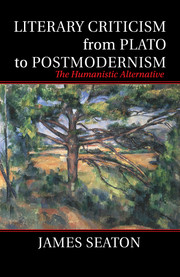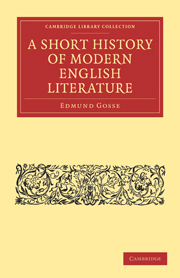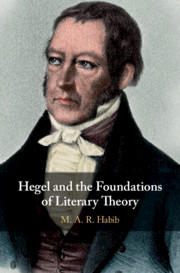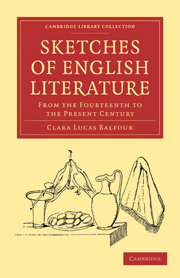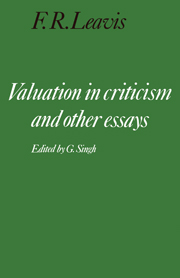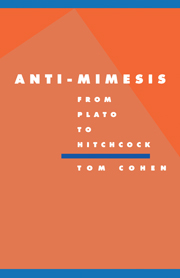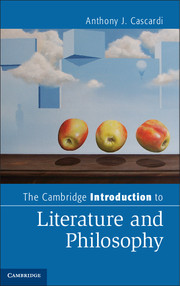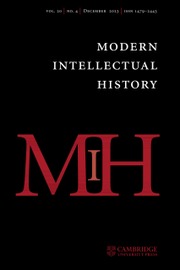Literary Criticism from Plato to Postmodernism
The Humanistic Alternative
- Author: James Seaton, Michigan State University
- Date Published: March 2016
- availability: Available
- format: Paperback
- isbn: 9781107514935
Paperback
Other available formats:
Hardback, eBook
Looking for an inspection copy?
This title is not currently available for inspection. However, if you are interested in the title for your course we can consider offering an inspection copy. To register your interest please contact [email protected] providing details of the course you are teaching.
-
This book offers a history of literary criticism from Plato to the present, arguing that this history can best be seen as a dialogue among three traditions - the Platonic, Neoplatonic, and the humanistic, originated by Aristotle. There are many histories of literary criticism, but this is the first to clarify our understanding of the many seemingly incommensurable approaches employed over the centuries by reference to the three traditions. Making its case by careful analyses of individual critics, the book argues for the relevance of the humanistic tradition in the twenty-first century and beyond.
Read more- Provides a brief, readable overview of the history of literary criticism in the West, with substantial sections on Plato, Neoplatonism, Aristotle, Neoclassicism, the Romantics, the New Critics, and postmodernism
- Illustrates the continuing significance of critics often overlooked by the contemporary academy, including figures such as Edmund Wilson, Lionel Trilling, and Ralph Ellison
- Argues the case for humanistic literary criticism in contrast to the cultural studies dominant today
Reviews & endorsements
'James Seaton is the only writer discussing the humanist tradition who has sufficient depth of learning to take it back to its origins in Plato and Aristotle. He has shown more clearly than anyone else the paradox of postmodernist theory that nothing can be certain except the postmodernists' own certainty that nothing is certain. This book is sui generis because he offers a practical alternative to the current reign of 'theory' and 'cultural studies'. His characteristic virtues as an essayist and literary critic - discrimination, undogmatic flexibility and vast learning - come through with great force in this book. Seaton is a writer deserving - no, demanding - serious attention.' Edward Alexander, University of Washington
See more reviews'This book discusses one of the most pressing issues besetting literary studies in higher education - the disengagement of the field from the cultural norms and interests of the American public. James Seaton approaches the issue in a scholarly manner, outlining two intellectual traditions that relate to the trend. The first charts a progressive disconnection of the literary critic from the reading public, and Seaton assigns it significant blame for the sliding fortunes of literary studies. The second exemplifies humanistic inquiry that takes literature as a special cultural object, incorporating theory but striving to integrate it into discourse that is accessible to educated laypersons while aiming to communicate with general readers and align intellectual values with bourgeois values. Seaton aims to steer literary scholars and teachers away from the first lineage and toward the second. We need this argument.' Mark Bauerlein, Emory University, Atlanta
'… [Seaton's] take on the recent history of literary criticism returns important voices to the conversation. He also issues a timely call for well-written literary criticism …' Steven Knepper, The Hedgehog Review
'… profound and crisply written … Seaton builds a strong case for humanism, and it is all the stronger because he follows his own rule of academic integrity.' Gary Saul Morson, The New Criterion
'… a much-needed reassessment of the two major traditions of Western literary criticism. … [it] is among the most thoughtful and informed recent assessments of the present state of literary criticism … one can only express deep appreciation for the author's painstaking efforts. … Seaton has produced a superb analysis of some of the most pressing of critical issues. … It is a book that has much to offer to all students of the humanities.' Jeffrey Folks, Modern Age
'… Seaton can turn a phrase with the best of them … [he has] his own unique style that remains as accessible to the educated layperson as it is to professional scholars of literature. … Held to his own high standards, Seaton succeeds: his chapters force you to consider what role literature has played in your own development, and how that role might play out in the lives of others.' Allen Mendenhall, The University Bookman
Customer reviews
Not yet reviewed
Be the first to review
Review was not posted due to profanity
×Product details
- Date Published: March 2016
- format: Paperback
- isbn: 9781107514935
- length: 236 pages
- dimensions: 218 x 142 x 14 mm
- weight: 0.3kg
- availability: Available
Table of Contents
Introduction
1. Plato and Neoplatonism
2. Romanticism and modernism
3. Theory and cultural studies
4. Aristotle and the humanistic tradition
5. Edmund Wilson and Lionel Trilling
6. Democracy, popular culture, and Ralph Ellison
7. Literary criticism, the humanities, and liberal education.
Sorry, this resource is locked
Please register or sign in to request access. If you are having problems accessing these resources please email [email protected]
Register Sign in» Proceed
You are now leaving the Cambridge University Press website. Your eBook purchase and download will be completed by our partner www.ebooks.com. Please see the permission section of the www.ebooks.com catalogue page for details of the print & copy limits on our eBooks.
Continue ×Are you sure you want to delete your account?
This cannot be undone.
Thank you for your feedback which will help us improve our service.
If you requested a response, we will make sure to get back to you shortly.
×
